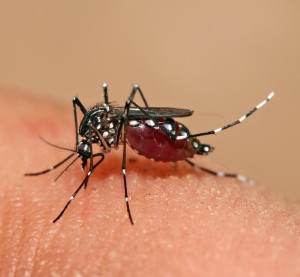by Sally PLOMLEY
sallyp@isb.ac.th
Dengue Fever
In Thailand we are currently experiencing a major outbreak of Dengue Fever. It is important that we limit potential exposure to the virus as well as recognise the symptoms of this potentially fatal disease.
Limiting exposure to mosquitoes is important in disease prevention. Limit areas for mosquito breeding such as stagnant water around the house. The mosquitos that spread Dengue Fever can bite any time (even the middle of the day) so use of insect repellants/long sleeved clothing where possible is important. Limit mosquitoes in the home using screens, mosquito coils and electrical devices. Keeping air conditioning on can also limit mosquito activity in the home.
Dengue fever is an infection caused by dengue viruses (4 different types).
It is common with an estimated 100 million people infected with the virus every year.
Dengue virus is transmitted by a bite from infected mosquitoes (Aedes aegypti and Aedes albopictus).
Symptoms:
Symptoms usually start 3 to 14 days (usually 4 to 7 days) after the mosquito bite.
The disease has a sudden onset and symptoms may include:
● fever for 3 to 7 days
● intense headache and pain behind the eyes
● muscle and joint pain
● loss of appetite
● vomiting and diarrhoea
● skin rash
● bleeding, usually from the nose or gums.
Recovery is sometimes associated with prolonged fatigue and depression.
Repeated episodes of dengue fever may result in excessive bleeding and shock but, with appropriate treatment, are rarely fatal.
Diagnosis of dengue fever is made by clinical presentation and a blood test.
Spread:
A mosquito becomes infected if it bites an infected person while the fever is present (an average period of about 3 to 5 days).
After biting an infected person it takes 4 to 10 days before the mosquito can infect other people.
The mosquito remains infective for life.
Dengue fever is not directly spread from person-to-person. It can be spread by person-mosquito-person spread.
Treatment:
There is no specific antiviral treatment available.
General recommendations include controlling fever and pain with paracetamol/acetaminophen rather than aspirin/Ibuprofen/Naproxen (may promote bleeding), and increasing fluid intake. Aspirin should not be given to children under 12 years of age unless specifically recommended by a doctor.
Dengue Haemorrhagic Fever is a complication of Dengue Fever in some people. It usually presents as the fever is subsiding.
Return IMMEDIATELY to see a doctor if any of the following warning signs appear:
● Severe abdominal pain or persistent vomiting
● Red spots or patches on the skin
● Bleeding from nose or gums
● Vomiting blood
● Black, tarry stools
● Drowsiness or irritability
● Pale, cold, or clammy skin
● Difficulty breathing
Prevention
● Exclusion from school or work is usually not necessary but people experiencing fever from dengue infection should not be in an environment where they may be bitten by mosquitoes. If this is not possible they should stay at home until they have no fever and are therefore no longer infectious (usually 3 to 5 days).
● A vaccine is being developed against Dengue Fever. It provides a varying level of immunity to the 4 different strains. It has been approved for use in some countries in 2016. It is currently not available for use in Thailand (and there is no information available about when it will be available). It is expected that it will only be available to people who have previously had Dengue Fever when it released (due to the fact there will be limited supply and you get sicker with Dengue Fever with subsequent infections)
● Personal protection and the environmental management of mosquitoes are important in preventing illness.
● Prevent access of mosquitoes to an infected person with a fever.
ISB is committed to your child’s overall development, both educationally and health related. Should you have any questions or concerns, please contact your healthcare provider or the ISB Health Clinic (nurse@isb.ac.th).


